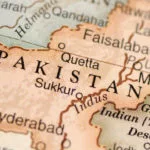
(NEW YORK) — The reports of hundreds of Pakistanis losing their lives as they attempted to enter Europe last week sent shockwaves across the country, forcing officials in Islamabad to acknowledge the increasing number of people embarking on perilous journeys.
An estimated 350 Pakistanis were on board the ill-fated and overcrowded boat that sank near Greece on June 14. Pakistan’s interior minister, Rana Sanaullah Khan, said only 104 people, including 12 Pakistanis, were rescued and 82 bodies were recovered.
“So far, 281 families have contacted the government saying their sons or dear ones might have been among those who were on the boat,” Khan said on national TV.
The Greece water tragedy is just the latest incident to shed light on the desperation that’s driving families to undertake dangerous journeys, hoping to find solace and refuge in foreign lands.
A similar incident happened in February. Shahida Raza, a professional national women’s hockey player, was among more than 60 people who died in a shipwreck off the cost of Italy.
“She was a national hero but she left the country for economic reasons and because she did not have a job,” Raza’s close friend, Sumaiya Mushtaq, told ABC News.
“She had a son with disability and, as a mother, she decided to leave the country because she would do anything for a better future for her son,” Mushtaq added. “When I heard the news, it was like I had died. I was devastated. Life [had stood] still for me.”
With a population of 250 million, Pakistan struggles with many economic and political crises. Human trafficking has become a thriving business, costing those who want to leave fees between $5,000 to $10,000, depending on the destination.
Khan noted that “hardly” any trafficker has been punished. But he added that laws are being amended so the “mafias involved in this heinous act can be punished.”
It’s not only the destitute who are fleeing the country; large numbers of educated youth are leaving the country in search of a better future.
Pakistan’s inflation rate is an unprecedented 38%, according to the Pakistan Bureau of Statistics. Industries are closing, unemployment is on the rise and people are finding it hard to survive on their earnings.
Sher Ali, 42, is forced to work for daily wages after losing his job as a factory worker. Ali told ABC News he can “barely feed his family of seven.”
Political polarization and tensions have also created confusion in the country.
“[The] political system has crippled the entire social fabric of the country,” Mian Aamer Mumtaz told ABC News.
He is the chief executive officer of an international consulting firm in Pakistan.
“The youth is no exception,” Mumtaz said. “Since they believe there is no concept of merit … [they] look for opportunities outside Pakistan where at least the system provides them opportunities to work hard and earn a decent living.”
Added Mushtaq: “There is no future for anyone here. When I open my eyes in the morning I wonder if my life is going to end like Shahida … it is very difficult to survive in Pakistan under this circumstance.”
Copyright © 2023, ABC Audio. All rights reserved.
